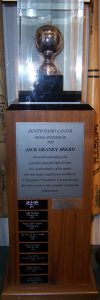Steadfast journalist defines Canadiana

 St. Marys – Driven. Loyal. Upright. Passionate. Proud Canadian. Humble. These are words commonly attributed to journalist Bob Elliott by players, fans and colleagues from coast to coast, and both north and south of the 49th parallel.
St. Marys – Driven. Loyal. Upright. Passionate. Proud Canadian. Humble. These are words commonly attributed to journalist Bob Elliott by players, fans and colleagues from coast to coast, and both north and south of the 49th parallel.
The accomplished author and Sun baseball columnist, who would much rather see his name in the byline than in any headline, was named the Jack Graney Award winner today by the Canadian Baseball Hall of Fame, an honour presented just 12 times in the 24 years since its inception, to a representative of the media who has made a significant contribution to the game of baseball to Canada through their life`s work. Elliott will be formally presented his award at on June 18th at the 2011 Induction Ceremony.
The description of the award`s criteria barely scratches the surface of Elliott, who publishes an annual list of Canada`s top 100 most influential baseball people, yet many would argue that he could easily be number one on the list.
The Kingston, Ontario native was born in 1949 on September 10th, a birth date that seems appropriately shared by Roger Maris and Joey Votto. He followed his highly-achieved father and grandfather`s steps both athletically and academically, and was planning on continuing the Elliott family trek to Queen`s University when the young second baseman who couldn`t hit the curve ball was offered a full-time position to write sports for the Kingston Standard in March of 1966.
The legend was born.
Elliott, who recently finished as the bridesmaid for the third consecutive year in the voting for the National Baseball Hall of Fame`s prestigious J.G. Taylor Spink Award, began writing for Ottawa-area newspapers for a decade before his first Major League game assignment came along, which was the Montreal Expos 1978 home opener.
“The Mets won 3-2, Skip Lockwood got the win, Rudy May took the loss, and Tom Grieve homered,” quite easily and not surprisingly recalled Elliott from his Mississauga home where he lives with his wife Claire.
He joined the Sun newspaper chain as the Blue Jays beat writer in 1987 and covered his 33rd consecutive Opening Day in 2010 when the the Texas Rangers hosted the Blue Jays.
As good a reporter and news breaker as Elliott has been in the major league world, it is his passion, his borderline obsession, with Canadian players that he is best known for, and the Canadian baseball family will remain forever grateful for his spotlighting of so many unsung accomplishments from the grass roots to the minor leagues.
Elliott has chronicled countless incredible stories at the community, provincial, national and international level, and somehow keeps abreast of not only how many Canadians are playing in the USA on scholarships, but how they are doing! He has now established a website, CANADIAN BASEBALL NETWORK , that tracks top Canadian candidates for the draft, Canadians in college, Canadians in the minor leagues, Team Canada updates, and everything in-between.
“Ìn 1998 there were 66 Canadians in the minors – today there are well over a hundred, and another fifty-plus on independent professional teams. In 2000 there were 490 kids playing in US colleges – today there are more than seven hundred,” stated Elliott.
“I see how hard our players work and they work as hard as hockey guys back when I covered the Ottawa ’67s, yet they get little recognition. The landscape is changing now with Shi Davidi of Canadian Press and John Lott of the National Post also writing about Canadians.”
Toronto Star baseball guru Richard Griffin doubles as the president of the Toronto chapter of the Baseball Writers of America, who nominated Elliott for the Spink Award. In his letter to Cooperstown, Griffin says: “Bob has been an ongoing positive influence on an entire country for the past 25 years and counting. Never has there been more Canadian college players, Canadian minor league players and as many contributing major leaguers from the Great White North than in the past decade and it’s guaranteed every one of those players, their parents and coaches have reached out at one time or other for advice and counsel from Bob Elliott.”
Elliott has also written three books, including the best seller “Hard Ball” about George Bell in 1990, “The Ultimate Blue Jays Trivia Book” in 1993 , and “The Northern Game: Baseball The Canadian Way” in 2005, with the forward by fellow Kingston native Don Cherry.
In his brief transition from questioner to answerer, Elliott revealed the following insights:
He attributes his passion for baseball to his father, and because he considers baseball to be the fairest game of all.
“In the NHL, teams would shadow Yvan Cournoyer. No one holds Votto’s bat when he swings or pushes Ryan Dempster when he gets to his balance point. It`s all about pitcher versus hitter.”
Elliott`s favourite players are hot corner icons Eddie Mathews, George Brett and Scott Rolen, because he feels that third base is a premium position that too often gets overlooked.
Buck Rodgers was the best manager Elliott ever covered. Coaches Larry Bearnarth and Galen Cisco taught him more about the game than any others.
The most quotable players Elliott dealt with were Steve Rogers and Jack Morris.
“Neither one of them ever used a cliché,” Elliott explained.
“I`ll never forget what Rogers said during the 1981 strike, when 21 of 26 teams were claiming to have lost money. Rogers said, `Who are you going to believe, a bunch of millionaires or 600 guys who started off making five hundred bucks a month? One owner owns a team because his father did. What did he work for?`”
The players with the most character that Elliott has encountered include Jerry White, Woody Fryman, Wallace Johnson, Todd Stottlemyre, Pat Borders and Devon White.
“They`re all stand-up guys who had struggles, overcame them, and got the best out of their abilities.”
Ellis Valentine is the player who Elliott most would have enjoyed seeing extend his career.
David Eckstein is another player Elliott admires because he made his university team as a walk-on, was cut by the Red Sox, and still went on to play ten years in the big leagues.
When asked to explain how Canada has produced three MVP`s in the past 13 years, when it had never occurred before Walker`s award in 1997, Elliott credits Greg Hamilton`s Canadian Junior National Team program, particularly when he began taking the team to compete in Latin America each Spring.
“And beyond Walker, Morneau and Votto, top prospects like Adam Loewen, Jeff Francis, Phillippe Aumont, Brett Lawrie, Kellin Deglan, Scott Thorman, James Paxton and Kyle Lotzkar all blossomed while playing for Team Canada,” Elliott added.
“Ìt has also been significant to see ex-pros like Jeff Zimmerman, Chris Reitsma, Paul Quantrill, Jason Dickson, Larry Walker, and Mike Johnson getting involved in the program.”
“But those players did arrive on Team Canada by accident. The great run Canada is currently having is also attributable to coaches like Doug Mathieson, Bill Green, John Harr, Rick Johnston and Bob Smyth.”
Elliott`s favourite baseball moments?
“There are two. First, seeing my son Bobby`s first homerun. Secondly, the World Baseball Classic in 2006. Case Field, Phoenix. Canada 8, Team USA 6. Team USA had four or five future Hall-of-Famers, but we took it to `em. It was like being there for Paul Henderson’s goal,” Elliott reminisced.
Family matters to Elliott, the proud father of two. His son Bobby is an accountant, and his daughter Alicia is an account manager for a fashion magazine.
“My parents would be proud of me today, and that means a great deal to me,” said Elliott, whose parents died within six months of each other in 1970.
“When I made the jump into sports writing, my dad made me promise that I would not become like the guy in 1941 who left Ted Williams off an MVP ballot because he didn`t like him. I still remember in 1995 when I was filling out my MVP ballot, and I moved a player from second to sixth because I thought he was a jerk. Then I remembered what my father told me and I moved him back to second. You should try to judge players by what they do, not the way they treat you.”
Elliott`s view of the Canadian Baseball Hall of Fame?
“The Hall has branded itself extremely well over the past decade, continues to gain respectability, and is talked about in all baseball circles. The Canadian baseball community would love to see the museum expand into the vacated school that they are considering, which would bring it to the level it deserves, like the Hockey Hall of Fame in Toronto. I think the future of the Hall will be determined by its ability to bring in teams and kids for camps and tournaments.”
On top of everything else, Elliott has been coaching baseball since he can remember, from Pee Wee to Senior.
He witnessed first-hand his father`s Kingston Lakeview Indians beating the Orillia Majors to win the 1967 OBA championship. He had caught the baseball bug and the fever hasn`t passed.
The Jack Graney Award is a lifetime achievement award, and while it is hoped that Bob Elliott`s best days still lie ahead of him, and that there are another thousand Canadians between the white lines that the columnist will write about in the future, the Canadian Baseball Hall of Fame and the Canadian baseball family all recognize that he has already easily surpassed what it takes to justify writing his name, permanently, on the Jack Graney trophy.
Previous winners of the Jack Graney Lifetime Achievement Award:
1987 – Neil MacCarl – Toronto Star
1988 – Milt Dunnell – Toronto Star
1990 – Austin “Dink” Carroll – Montreal Gazette
1991 – Joe Crysdale & Hal Kelly – CKEY
1996 – Dave Van Horne – TSN & CIQC
2001 – Tom Cheek – Toronto Blue Jays
2002 – Ernie Harwell – Detroit Tigers
2003 – Allan Simpson – Baseball America
2004 – Jacques Doucet – Montreal Expos
2005 – Len Bramson – TBS Sports
2009 – Ian MacDonald – Montreal Gazette
2010 – Bob Elliott – Toronto Sun & canadianbaseballnetwork.com
Note: Jack Graney’s road to the big leagues began in St. Thomas, Ontario, where he was born and recommended to the Chicago Cubs by fellow Canadian Baseball Hall-of-Famer, Bob Emslie. After a season in the Cubs organization, Graney was sold to the Cleveland, where he would evolve into a steady, dependable outfielder. His big league resume boasts a number of firsts. When Graney walked to the plate in a game against the Red Sox on July 11, 1914, he became the first batter to face Babe Ruth. Almost two years later, on June 26, 1916, he would be the first major leaguer to bat wearing a number on his uniform. A scrappy leadoff hitter, Graney would lead the American League in walks twice (1917 and 1919) and in doubles once (1916). The speedy Canuck also finished in the top 10 in triples in 1913 and 1916, with 12 and 14 three-baggers respectively. He was also a member of the World Series-winning Indians squad in 1920.
Following his playing career, Graney became the first ex-player to make the transition to the broadcast booth, performing radio play-by-play for the Indians from 1932 to 1953.












